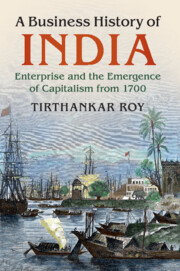Book contents
- A Business History of India
- A Business History of India
- Copyright page
- Dedication
- Contents
- Figures
- Maps
- Tables
- Boxes
- Preface
- 1 Introduction
- 2 The Baseline at 1700
- 3 The Indian Ocean Sphere: 1700–1850
- 4 Capital and Empire (1850–1930)
- 5 Capital and Empire (1850–1930)
- 6 State and Industrialisation: 1930–1950
- 7 State and Industrialisation: 1950–1980
- 8 Revival: 1980–2000
- 9 Capital and Globalisation: 2000–2015
- 10 Conclusion
- References
- Index
Preface
Published online by Cambridge University Press: 20 March 2018
- A Business History of India
- A Business History of India
- Copyright page
- Dedication
- Contents
- Figures
- Maps
- Tables
- Boxes
- Preface
- 1 Introduction
- 2 The Baseline at 1700
- 3 The Indian Ocean Sphere: 1700–1850
- 4 Capital and Empire (1850–1930)
- 5 Capital and Empire (1850–1930)
- 6 State and Industrialisation: 1930–1950
- 7 State and Industrialisation: 1950–1980
- 8 Revival: 1980–2000
- 9 Capital and Globalisation: 2000–2015
- 10 Conclusion
- References
- Index
Summary
When I started a career in economic history in the 1990s, interest in history was growing in the top economics schools of the world. The availability of cross-country historical income data, popularity of institutionalism, and new developments in the theory of growth rekindled interest in an old and halfforgotten question: Why do some countries grow rich and others remain poor? In the 2000s, historians criticised institutionalism. The exchange that followed became known as the divergence debate. In the last 20 years, the divergence debate formed the stem of the economic history field.
I joined this discussion from a base in Indian history, and with a vague feeling that the divergence debate did not serve India well. Over the years, that feeling developed into an argument. The argument has two parts. First, the theoretical models used to explain how the world became more unequal from the nineteenth century, failed to explain the recent emergence of India and China. Models that predicted divergence could not predict convergence in an easy way, and therefore, they were unreliable as theories about the past. Second, the debate encouraged the student of world history to ask the wrong question, that is, why India fell behind Europe and stayed poor. Capitalists in the region – where the volume of trade grew hundredfold, and the fourth largest cotton mill industry of the world emerged in 1850–1950 – did not either fall behind or stay poor. By starting with the falling-behind question, divergence historians missed the central paradox of Indian economic history: the coexistence of robust capitalism and stagnant agriculture.
This book turns the narrative around. It is not about falling behind, nor about what went wrong with India. It is about capitalism, and what went right. As business history, it does what business historians do the world over, which is to study how firms, entrepreneurs, communities, and organisations adapt to the environment, or what happens to corporate governance when companies are run by families and small groups like the managing agents of the past. As economic history, it foregrounds what I believe is the biggest puzzle about India, indeed about emerging economies in general – how does capitalism grow in a region where capital is an expensive resource? The book is an attempt to answer this question.
- Type
- Chapter
- Information
- A Business History of IndiaEnterprise and the Emergence of Capitalism from 1700, pp. xiii - xivPublisher: Cambridge University PressPrint publication year: 2018

